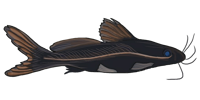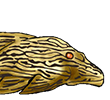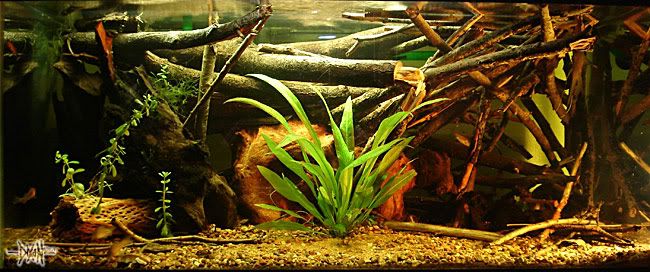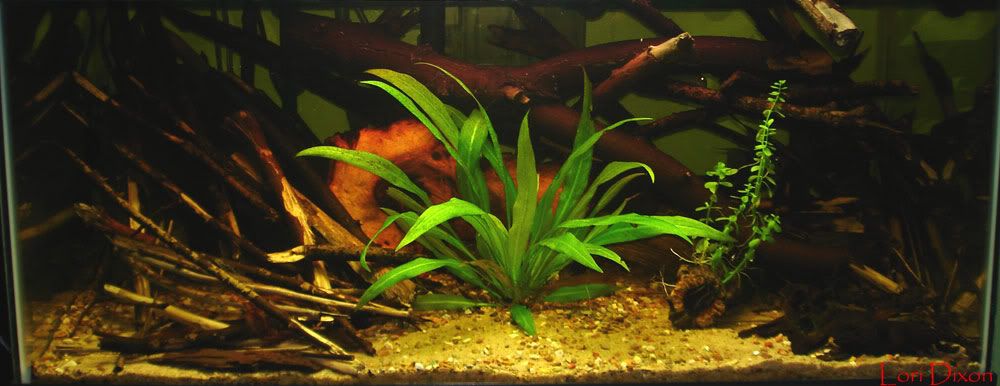3 foot "Log Jam" tank (40 gallon breeder)
- BlkMagik79
- Posts: 20
- Joined: 21 Sep 2007, 09:01
- Location 1: Broken Arrow, OK
Kostas - sidguppy started being rude towards the begining of the thread then edited it out. He has also been rude in other threads, via PM as well as on another forum to both Seedy and myself. I'm not sure how many have followed this thread from the begining but I have as this is MY tank and was looking for imput but was not registered therefore asked Seedy to post it for me. It is very apparent to me that sidguppy is currently back-peddling as quickly as he can and I ended up joining this forum just to defend my tank.
Ummm...I'm not good with signatures...Seedy's Wife
- Kostas
- Posts: 791
- Joined: 23 Apr 2003, 10:57
- I've donated: $256.00!
- My images: 19
- My cats species list: 14 (i:0, k:0)
- My aquaria list: 1 (i:1)
- Spotted: 6
- Location 1: Greece,Athens
- Location 2: Greece,Athens
- Interests: Fishkeeping,diving,skiing,r/c modeling,growing Palm trees,ferns and tropical plants
- Contact:
Hi BlkMagik79,
I dont know if there is prehistory in it...He just wasnt deserving that kind of replys in this thread... And i am not blaming anyone here...We just all are better off being milder
And i am not blaming anyone here...We just all are better off being milder 
And now back to our oringinal subject which is how you can improove your tank I think that if you add some branched branches,position more freely(i.e. not all horizontial and like a match) the existing twigs and position the thick branch you have with the cut end visible so that its cut end is in the substrate,looking like a root,your tank will look as natural as it goes
I think that if you add some branched branches,position more freely(i.e. not all horizontial and like a match) the existing twigs and position the thick branch you have with the cut end visible so that its cut end is in the substrate,looking like a root,your tank will look as natural as it goes  But its beautifull and natural looking anyway...
But its beautifull and natural looking anyway... 
I dont know if there is prehistory in it...He just wasnt deserving that kind of replys in this thread...
And now back to our oringinal subject which is how you can improove your tank
Last edited by Kostas on 23 Sep 2007, 12:22, edited 3 times in total.
- BlkMagik79
- Posts: 20
- Joined: 21 Sep 2007, 09:01
- Location 1: Broken Arrow, OK
-
N2Biomes
- Posts: 27
- Joined: 13 Jun 2007, 18:34
- I've donated: $120.00!
- My images: 7
- My cats species list: 1 (i:0, k:0)
- Spotted: 4
- Location 1: United States
Seedy,
I tried posting my reply 3 times last night, just after your post to me – every time I came to add more, all the text was gone, so I gave up and decided to post this morning. Wow, a whole lot of posts happened in the meanwhile.
First, as you all now know, UncleRick had my permission to use the photo of my Royal, so you can certainly keep the photo up here. I had no idea that it would be involved in a "to cholla or not to cholla" discussion. I am a registered member of PlecoFanatics, and we are having the same discussion over there.
Aside, not a Thread Hijack:
Thank you for your compliment on my new little Royal! This is the third one that I purchased from one of my LFSs, and obviously the healthiest. The first 2 had sunken tummies and I purchased them thinking that I could give them a better home than the LFS (no wood in the tank!). Unfortunately, both didn't survive. With this one, I took no changes, and treated it with Parasite Clear. This must have been the magic bullet, since its alive and well and now in my plec show tank.
Before purchasing the chews from UncleRick, I did ask questions and got replies from him, not as much info as he’s posted here, but enough to feel comfortable offering the cholla to my Royal. I was directed to this thread because I’d also posted the photo at PF and a member suggested I go read what was written here about it. Given that my Royal is the first of several to survive, I certainly didn’t want to feed it something thought by some here to contain toxins. I usually do a fair amount of research before trying something new; I perhaps too quickly removed the chew from the tank.
Welcome to the PlanetCatfish Forum, and thanks, UncleRick, for your post! This information, along with Seedy’s reference to the experienced Panaque owner, has made my decision to replace the chew into the Royal’s environment an easy one.
And now, back to the topic at hand:
BlkMagik79, you have a lovely tank for Panaques! I love your idea of a “log jam”! Thanks for posting it, N2Biomes.
I tried posting my reply 3 times last night, just after your post to me – every time I came to add more, all the text was gone, so I gave up and decided to post this morning. Wow, a whole lot of posts happened in the meanwhile.
First, as you all now know, UncleRick had my permission to use the photo of my Royal, so you can certainly keep the photo up here. I had no idea that it would be involved in a "to cholla or not to cholla" discussion. I am a registered member of PlecoFanatics, and we are having the same discussion over there.
Aside, not a Thread Hijack:
Thank you for your compliment on my new little Royal! This is the third one that I purchased from one of my LFSs, and obviously the healthiest. The first 2 had sunken tummies and I purchased them thinking that I could give them a better home than the LFS (no wood in the tank!). Unfortunately, both didn't survive. With this one, I took no changes, and treated it with Parasite Clear. This must have been the magic bullet, since its alive and well and now in my plec show tank.
Before purchasing the chews from UncleRick, I did ask questions and got replies from him, not as much info as he’s posted here, but enough to feel comfortable offering the cholla to my Royal. I was directed to this thread because I’d also posted the photo at PF and a member suggested I go read what was written here about it. Given that my Royal is the first of several to survive, I certainly didn’t want to feed it something thought by some here to contain toxins. I usually do a fair amount of research before trying something new; I perhaps too quickly removed the chew from the tank.
Welcome to the PlanetCatfish Forum, and thanks, UncleRick, for your post! This information, along with Seedy’s reference to the experienced Panaque owner, has made my decision to replace the chew into the Royal’s environment an easy one.
And now, back to the topic at hand:
BlkMagik79, you have a lovely tank for Panaques! I love your idea of a “log jam”! Thanks for posting it, N2Biomes.
I would like to add some additional information to this topic. First of all the species in question here does not have microscopic spines. One species that does have these glochids (microscopic spines) is Opuntia basilaris, however, the species we are talking about is Cylindropuntia bigelovii which has large barbed spines. So Sid, we were both incorrect about the issue of this cactus skeleton possibly being contaminated with glochids, since this species doesn't even have them.
Now technically speaking, Cylindropuntia bigelovii does contain one possible toxin specifically oxalic acid, however, I don't feel that the cactus skeleton contains enough oxalic acid to be considered even mildly toxic. And after all, we humans consume many foods which contain high levels of oxalic acid such as mustard greens, rhubarb, buckwheat, black pepper, parsley, and beets just to mention a few. Now I'm not aware of anyone that has died from eating these foods so just like everything in life, moderation would be the key here.
All I can say is when I'm wrong, I can admit it, and that's why I posted additional accurate information so everyone could be clear on the issue of the pleco chews. I didn't see Sid providing us with any additional information other than we are all stupid and he is in a class far above the rest of us. A truly intelligent person would not be so critical of others not gifted with such a high level of understanding as themselves and would also be aware that everyone needs to be tolerant of each other's opinions.
Now technically speaking, Cylindropuntia bigelovii does contain one possible toxin specifically oxalic acid, however, I don't feel that the cactus skeleton contains enough oxalic acid to be considered even mildly toxic. And after all, we humans consume many foods which contain high levels of oxalic acid such as mustard greens, rhubarb, buckwheat, black pepper, parsley, and beets just to mention a few. Now I'm not aware of anyone that has died from eating these foods so just like everything in life, moderation would be the key here.
All I can say is when I'm wrong, I can admit it, and that's why I posted additional accurate information so everyone could be clear on the issue of the pleco chews. I didn't see Sid providing us with any additional information other than we are all stupid and he is in a class far above the rest of us. A truly intelligent person would not be so critical of others not gifted with such a high level of understanding as themselves and would also be aware that everyone needs to be tolerant of each other's opinions.
-
UNCLERICK666
- Posts: 6
- Joined: 23 Sep 2007, 01:38
- Location 1: BOSTON, MA. U.S.A.
- Contact:
AND THE BEAT GOES ON!
I DON'T FEEL IT'S RIGHT TO KEEP POSTING IN THIS THREAD.....So I'll start another....My apologies to the original poster, He only wanted suggestions on how to have a more natural looking tank and got controversy instead.
So if Your interested see the new thread....
ARE PLECO CHEWS SAFE? & OTHER OBSERVATIONS
So if Your interested see the new thread....
ARE PLECO CHEWS SAFE? & OTHER OBSERVATIONS
ENLIGHTMENT DOESN'T CARE HOW YOU GET THERE!
- Kostas
- Posts: 791
- Joined: 23 Apr 2003, 10:57
- I've donated: $256.00!
- My images: 19
- My cats species list: 14 (i:0, k:0)
- My aquaria list: 1 (i:1)
- Spotted: 6
- Location 1: Greece,Athens
- Location 2: Greece,Athens
- Interests: Fishkeeping,diving,skiing,r/c modeling,growing Palm trees,ferns and tropical plants
- Contact:
-
Haavard Stoere
- Posts: 1128
- Joined: 27 Jan 2005, 22:56
- My articles: 3
- My images: 65
- My cats species list: 22 (i:0, k:0)
- My aquaria list: 10 (i:9)
- Spotted: 16
- Location 1: Norway, Stavanger
- BlkMagik79
- Posts: 20
- Joined: 21 Sep 2007, 09:01
- Location 1: Broken Arrow, OK
Kostas - We haven't seen either Panaque since adding the wood...We finally had to go searching them out to make sure they were OK and both were happily munching in the back where it is darker. For that picture, yes I added light to the tank. I borrowed the cf lighting from my planted tank so that I could get a good pic.
Haavard - Thanks...Hope the picture of the tank helps with your lecture!!!
Haavard - Thanks...Hope the picture of the tank helps with your lecture!!!
Ummm...I'm not good with signatures...Seedy's Wife
- Kostas
- Posts: 791
- Joined: 23 Apr 2003, 10:57
- I've donated: $256.00!
- My images: 19
- My cats species list: 14 (i:0, k:0)
- My aquaria list: 1 (i:1)
- Spotted: 6
- Location 1: Greece,Athens
- Location 2: Greece,Athens
- Interests: Fishkeeping,diving,skiing,r/c modeling,growing Palm trees,ferns and tropical plants
- Contact:
Hi BlkMagik79,
The reason you havent seen them is exactly the fact that you added new wood...Panaque generally remain on the old woods they have got used to when you add new woods and take them a few days to start exploring the new pieces...So,because you added the new woods towards the front,they just dont come to the front and remain to the good old back woods In a few days you will start seing them in the wood tangle you have made
In a few days you will start seing them in the wood tangle you have made 
So i guess the tank acually remains darker,as it was which looks better than with more light,it seems more natural
The reason you havent seen them is exactly the fact that you added new wood...Panaque generally remain on the old woods they have got used to when you add new woods and take them a few days to start exploring the new pieces...So,because you added the new woods towards the front,they just dont come to the front and remain to the good old back woods
So i guess the tank acually remains darker,as it was which looks better than with more light,it seems more natural
- BlkMagik79
- Posts: 20
- Joined: 21 Sep 2007, 09:01
- Location 1: Broken Arrow, OK
Yeah I really like the tank darker for the most part...I have to have kind of strong light over the plants but the back of the tank tends to stay pretty dark. I did finally see both Panaque when I turned on the lights this morning. The L191 looks great, nice and fat  ...unfortunately by the time I got the camera he had disappeared and hasn't been seen since, and I still haven't managed to get a picture of the P. maccus
...unfortunately by the time I got the camera he had disappeared and hasn't been seen since, and I still haven't managed to get a picture of the P. maccus  Oh well I guess I will keep trying to catch them out when I have a camera ready...
Oh well I guess I will keep trying to catch them out when I have a camera ready...
- Kostas
- Posts: 791
- Joined: 23 Apr 2003, 10:57
- I've donated: $256.00!
- My images: 19
- My cats species list: 14 (i:0, k:0)
- My aquaria list: 1 (i:1)
- Spotted: 6
- Location 1: Greece,Athens
- Location 2: Greece,Athens
- Interests: Fishkeeping,diving,skiing,r/c modeling,growing Palm trees,ferns and tropical plants
- Contact:
Your L191 at some point will start coming out even with lights open and will stay visible and not be afraid of you...  But this takes time...At a few months he will be much more outgoing...
But this takes time...At a few months he will be much more outgoing... 
As for Panaque maccus,dont be disapointed,i have mine 6 years now and i only have one picture of him,which in fact was a chance shot as i was taking a photo of my Platydoras costatus at that time and noticed him in the picture when i viewed it on the pc...
As for Panaque maccus,dont be disapointed,i have mine 6 years now and i only have one picture of him,which in fact was a chance shot as i was taking a photo of my Platydoras costatus at that time and noticed him in the picture when i viewed it on the pc...
- Seedy
- Posts: 180
- Joined: 27 Apr 2006, 08:32
- Location 1: Tulsa OK USA
- Interests: Scuba, Sport/Defense Shooting (handgun), Fishing and Cichlids
- Contact:
New Pics:
Panaque maccus
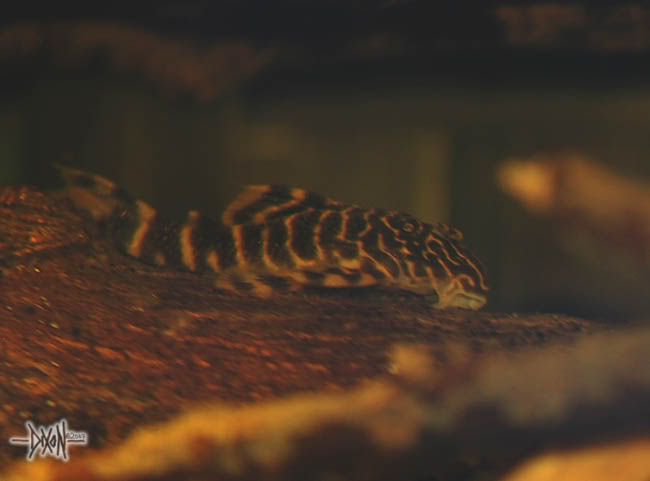
Panaque sp. "L191"
[IMG:650:435]http://i2.photobucket.com/albums/y5/see ... C_3118.jpg[/img]
Panaque maccus

Panaque sp. "L191"
[IMG:650:435]http://i2.photobucket.com/albums/y5/see ... C_3118.jpg[/img]
- worton[pl]
- Posts: 621
- Joined: 08 Jul 2004, 19:13
- My images: 2
- My cats species list: 11 (i:0, k:0)
- My aquaria list: 3 (i:2)
- Spotted: 1
- Location 1: Lublin, Poland
- Location 2: Warsaw, Poland
- Interests: catfishes, motorcycles
- Contact:
Hi,
Seedy may I ask how you prepare branches before putting them in a tank? Are they special in any meaning or just randomly taken branches from hard-wood trees? I always wanted few branches in my tank but was too afraid :).
Tank looks very cool.
Regards.
Seedy may I ask how you prepare branches before putting them in a tank? Are they special in any meaning or just randomly taken branches from hard-wood trees? I always wanted few branches in my tank but was too afraid :).
Tank looks very cool.
Regards.
Like a true nature's child
We were born, born to be wild
We can climb so high
I never wanna die
Born to be wild
Born to be wild
Steppenwolf, Born to Be Wild
We were born, born to be wild
We can climb so high
I never wanna die
Born to be wild
Born to be wild
Steppenwolf, Born to Be Wild
- Seedy
- Posts: 180
- Joined: 27 Apr 2006, 08:32
- Location 1: Tulsa OK USA
- Interests: Scuba, Sport/Defense Shooting (handgun), Fishing and Cichlids
- Contact:
Hi worton[pl]!
The branches came from my and my families various residences (That way we knew if any pesticides or fertilizers had or had not been used on what trees).
Some branches and smaller twigs were "live" cut off the tree while some came from a brush pile of broken limbs from the winter's ice storm and were weathered.
The sticks that would fit in my largest cooking pot where boiled 1-3 times to attempt to kill any possibly harmful local flora/fauna. The largest pieces where "basted" with boiling water in a turkey pan in a broiler oven...
When we do water changes on the tank, all wood is removed from the tank so a thorough gravel vacuuming can take place. I did remove one of the larger pieces of maple as it began to stink and was discovered to have been bored into numerous times by some kind of an insect. I suspect that there where dead or dying insect inside the wood causing it to stink.
Expect MASSIVE tannin staining...but then again, I like tea colored water
The branches came from my and my families various residences (That way we knew if any pesticides or fertilizers had or had not been used on what trees).
Some branches and smaller twigs were "live" cut off the tree while some came from a brush pile of broken limbs from the winter's ice storm and were weathered.
The sticks that would fit in my largest cooking pot where boiled 1-3 times to attempt to kill any possibly harmful local flora/fauna. The largest pieces where "basted" with boiling water in a turkey pan in a broiler oven...
When we do water changes on the tank, all wood is removed from the tank so a thorough gravel vacuuming can take place. I did remove one of the larger pieces of maple as it began to stink and was discovered to have been bored into numerous times by some kind of an insect. I suspect that there where dead or dying insect inside the wood causing it to stink.
Expect MASSIVE tannin staining...but then again, I like tea colored water
- worton[pl]
- Posts: 621
- Joined: 08 Jul 2004, 19:13
- My images: 2
- My cats species list: 11 (i:0, k:0)
- My aquaria list: 3 (i:2)
- Spotted: 1
- Location 1: Lublin, Poland
- Location 2: Warsaw, Poland
- Interests: catfishes, motorcycles
- Contact:
- Kostas
- Posts: 791
- Joined: 23 Apr 2003, 10:57
- I've donated: $256.00!
- My images: 19
- My cats species list: 14 (i:0, k:0)
- My aquaria list: 1 (i:1)
- Spotted: 6
- Location 1: Greece,Athens
- Location 2: Greece,Athens
- Interests: Fishkeeping,diving,skiing,r/c modeling,growing Palm trees,ferns and tropical plants
- Contact:
- Seedy
- Posts: 180
- Joined: 27 Apr 2006, 08:32
- Location 1: Tulsa OK USA
- Interests: Scuba, Sport/Defense Shooting (handgun), Fishing and Cichlids
- Contact:
After the recent power outage we had due to an Ice Storm, we did a major water change and "search" to make sure everything survived. Despite 2 and a half days of no filtration/heat before we acquired a generator we have had no losses in this tank. Stocking list is the same as when 1st posted. Here's a few shots of the water change and fish.
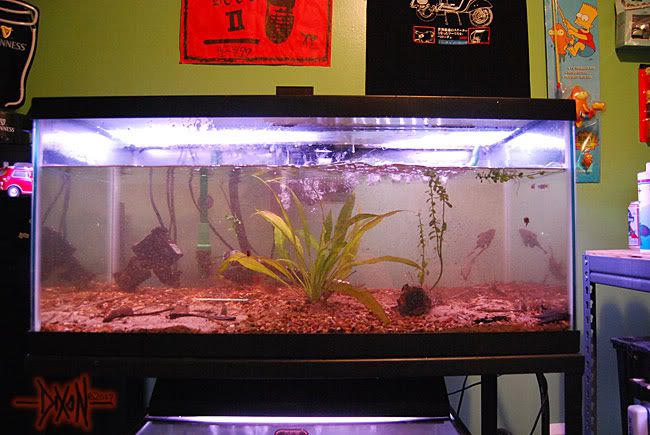
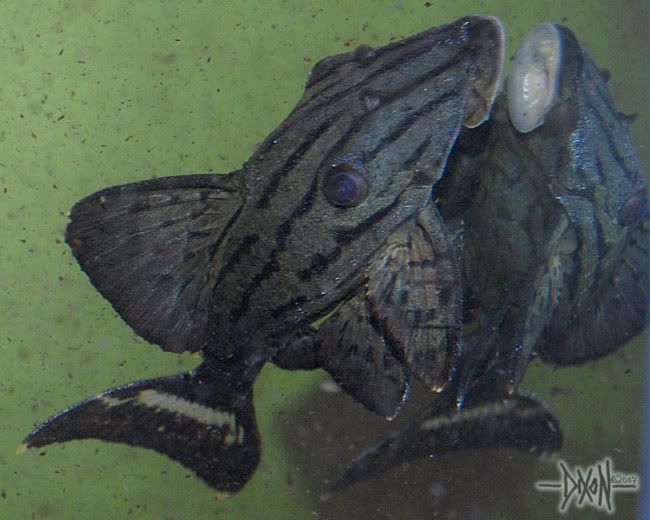
After Water Change:
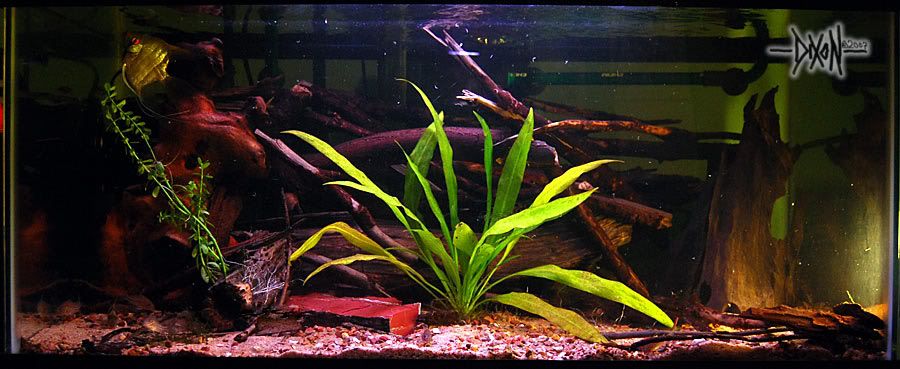
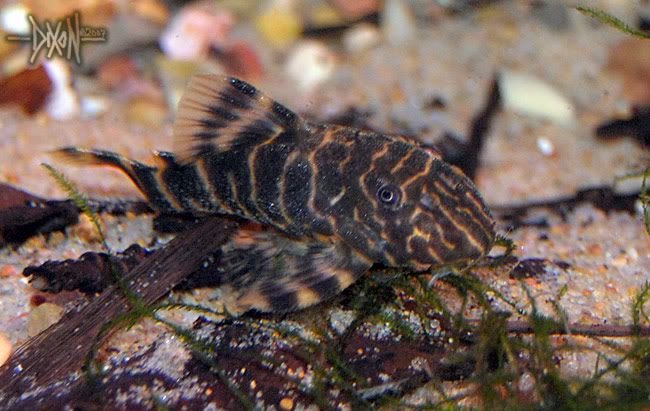
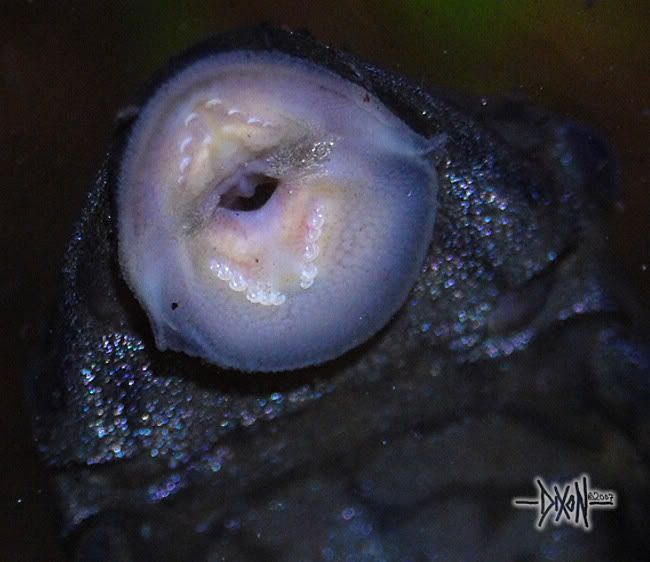
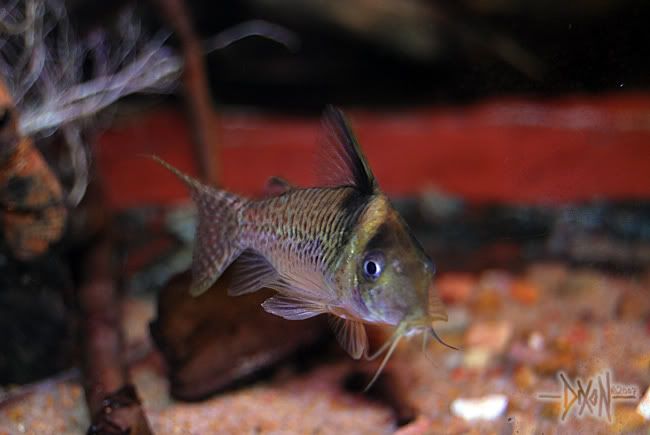
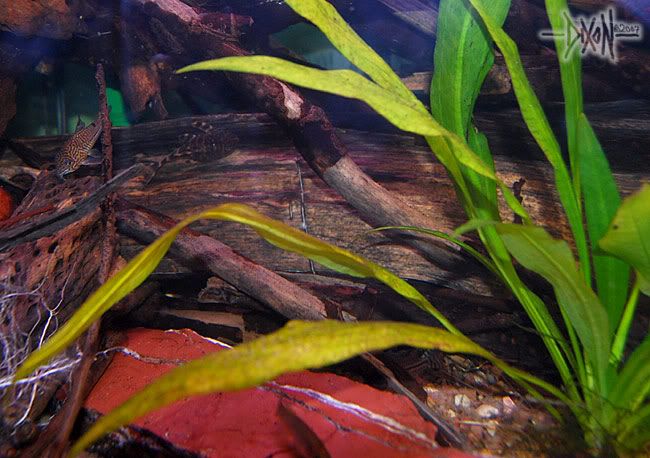


After Water Change:





-
Marc van Arc
- Expert
- Posts: 5038
- Joined: 19 Dec 2004, 14:38
- My articles: 20
- My images: 61
- My catfish: 9
- Spotted: 35
- Location 2: Eindhoven, The Netherlands
- apistomaster
- Posts: 4735
- Joined: 10 Jun 2006, 14:26
- I've donated: $90.00!
- My articles: 1
- My cats species list: 12 (i:0, k:0)
- My Wishlist: 1
- Location 1: Clarkston, WA, USA
- Location 2: Clarkston, WA, USA
- Interests: Aquaculture and flyfishing
I don't know of any documentation that this cactus is hazardous to fish, only opinions from those who haven't tried it.
I doubt that this stuff is problematic. Maybe some species like the San Pedro Cactus or the Peyote Cacti could cause your fish to have vision quests due their mescaline content. Not something one is likely to come across.
 Furthermore, the alkaloids are notoriously unstable and rapidly decomposed when exposed to heat and oxygen. Boiling the skeletons before using would extract any residua.
Furthermore, the alkaloids are notoriously unstable and rapidly decomposed when exposed to heat and oxygen. Boiling the skeletons before using would extract any residua.
The alkaloid contents of Cacti is always contained in the flesh or flowers; not their fibrous skeletons. They are also sulfate or hydrochloride salts, water soluble and easily extracted by boiling. Some have strychnine-like alkaloids but again, easily removed by boiling. Chola contains none of these compounds. The skeletons are just cellulose.
Some of the few desert plants that should be avoided are the Creosote Bush and Sage Brush but I think that it is highly unlikely that these would ever be sold for aquarium use.
I doubt that this stuff is problematic. Maybe some species like the San Pedro Cactus or the Peyote Cacti could cause your fish to have vision quests due their mescaline content. Not something one is likely to come across.
The alkaloid contents of Cacti is always contained in the flesh or flowers; not their fibrous skeletons. They are also sulfate or hydrochloride salts, water soluble and easily extracted by boiling. Some have strychnine-like alkaloids but again, easily removed by boiling. Chola contains none of these compounds. The skeletons are just cellulose.
Some of the few desert plants that should be avoided are the Creosote Bush and Sage Brush but I think that it is highly unlikely that these would ever be sold for aquarium use.
Avid Trout fly fisherman. ·´¯`·...¸><)))º>
